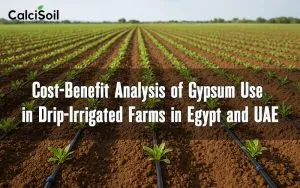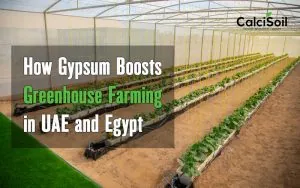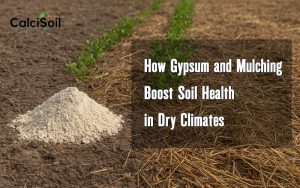
Gypsum also known as calcium sulfate is used as natural fertilizer a soil amendment, improving its chemical and physical properties.
Available in the form of a fine powder, it allows rapid availability of nutrients.
_ Agricultural Gypsum provides approximately 17% sulfate anion and 23% calcium oxide, the way in which plants assimilate these nutrients.
_ It stimulates the root and vegetative growth of crops, favoring activity of nitrogen-fixing bacteria.
_ Involved in the flowering of chlorophyll.
_ It allows a better use of other nutrients such as: potassium, phosphorus and magnesium.
_ Recovers sodic soils. Agricultural Gypsum is used as an amendment in alkaline soils with high sodium levels. In which it reacts with the sulfate from the product, forming sodium sulfate. Which is highly soluble and can be removed from the area of influence of the roots. through deep irrigation.
_ Improves soil structure. Agricultural Gypsum produces a flocculation of soil particles. That is, it forms aggregates producing a greater number of pores and consequently greater soil aeration.
_ Corrects alkaline soils that decrease productivity. Agricultural Gypsum reacts with salts accumulated in the soil, making them more soluble, facilitating drainage and soil work.
_ Its use in organic agriculture is feasible because it is a natural and non-toxic product.
RECOMMENDED FOR USE IN
_ Soils poor in organic matter.
_ Soils with crops that require calcium and sulfur.
_ Sandy and clay soils.
_ Compacted soils.
_ Direct application in the field.
_ soils with water infiltration problems.
ADVANTAGES OF GYPSUM (calcium sulfate)
_ It is easy to apply.
_ Inexpensive source of sulfur and calcium.
_ Non-toxic natural product.
Agricultural gypsum as a source of calcium and sulfur
Calcium is a nutrient that has limited mobility within the plant. So it must be constantly available for the roots to have an adequate supply. since deficiency, plant does not remobilize calcium to the sites of greatest demand, that is, often critical in fruiting period. Calcium additions from a source such as agricultural gypsum can improve the quality of horticultural crops.
Root crops appear to be especially sensitive to calcium. for example using gypsum as calcium fertilizer for peanuts is well known in the southeastern United States. where adequate amounts of calcium must be present for proper development of peanuts. Peanut root rot by Phytophthora, watermelon and tomato blossom end rot, apples bitter-pit are partially controlled with agricultural gypsum applications.
Gypsum has been used as a source of sulfur in many soils deficient in this macronutrient. where improvements in production have been obtained in crops such as corn, soybeans, canola and alfalfa. Gypsum has ability to provide sulfur and calcium continuous release in soil for a long time, given its moderate solubility. You can buy agricultural gypsum from Ever Bright Global General Trading. Please leave us a message at everbrightr@gmail. com, we will be happy to hear from you.







